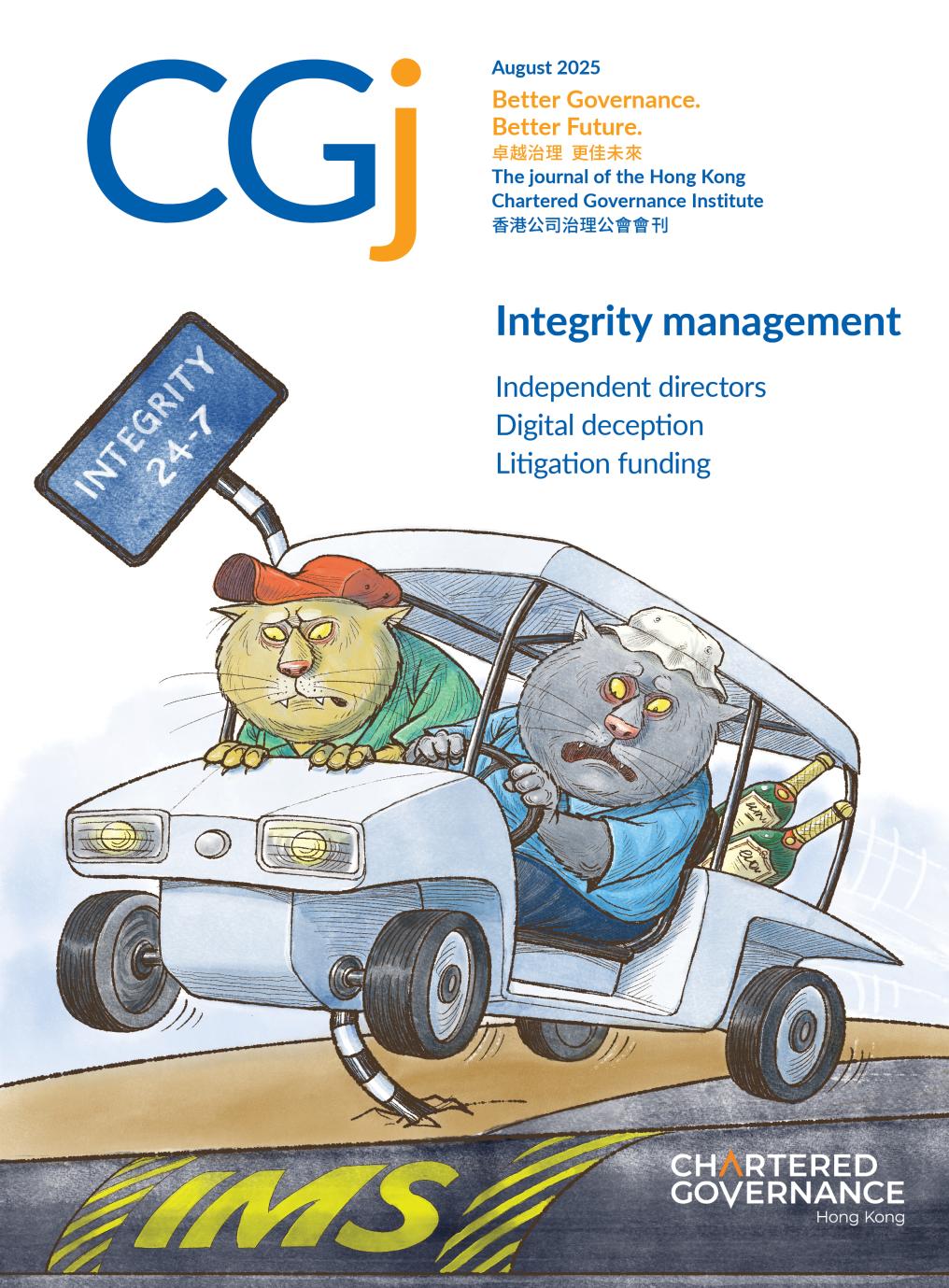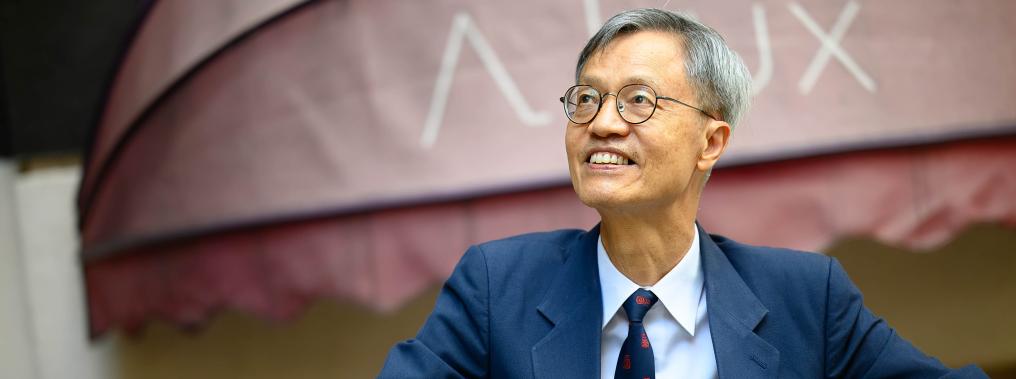
Aligning investor expectations of independent directors
CGj reviews an Institute seminar held in March 2025 exploring how listed companies can align with Hong Kong’s new regulations on board independence, tenure limits and investor expectations.
Highlights
- the new regulations on INED tenure aim to accelerate board renewal, but Hong Kong’s shallow talent pool may slow the pace of change
- institutional investors are increasingly scrutinising INED appointments, as well as demanding stronger disclosure and succession planning
- Hong Kong’s remuneration levels and informal nomination networks may hinder efforts to attract and retain truly independent directors
Following the publication of its Consultation Conclusions in December 2024, The Stock Exchange of Hong Kong Limited (the Exchange)’s proposed amendments to the Corporate Governance Code and related Listing Rules, designed to advance good corporate governance practices in Hong Kong and to enhance board effectiveness – particularly in relation to independent non-executive directors (INEDs) – came into effect on 1 July 2025. In preparation for these regulatory amendments, the Institute held a seminar in March 2025, titled Aligning Investor Expectations of Independent Directors – Tenure, Responsibility and Commitment, to explore the practical implications of the reforms, with a special focus on board independence and renewal, tenure limits, nomination processes and investor expectations.
Hong Kong’s governance landscape
In his presentation, Herman Choi, Head of APAC Advisory, ISS-Corporate, first pointed out that the board composition and shareholder structure of Hong Kong listed companies has created a structural challenge to board independence.
‘In Greater China, shareholding is highly concentrated in founding families or the state,’ Mr Choi said. ‘We can easily identify companies in which significant shareholders, or even controlling shareholders, have a stake of 50% or more. With such a shareholder structure, it is inevitable that the board is more likely to be dominated by the executive and nonexecutive directors affiliated with the significant shareholders.’
Such an ownership structure poses a unique challenge for investors. ‘From an investor perspective, a significant shareholder may have an economic incentive to exploit its control over the board, or to utilise its economic influence or control over financial resources to gain profit, but that generally comes at the expense of the minority shareholders,’ Mr Choi explained.
Another concerning trend in Hong Kong is the number of companies in which the nomination committee is chaired by an executive director. This is the case for approximately 30% of Hong Kong listed companies, according to the International Shareholder Services (ISS) Governance QualityScore, a proprietary governance rating that assesses a company’s corporate governance risk across four pillars, comprising board structure, remuneration, shareholder rights and takeover defences, and audit and risk oversight.
This raises a red flag for institutional investors. ‘Investors may be worried about the nomination process and how much that is influenced by the executive, as well as whether independent directors are selected based on personal relationship, or on professional background and skill sets,’ Mr Choi said.
He stressed that independence should be assessed both quantitatively and qualitatively, with a robust and impartial nomination process being key to ensuring genuine board diversity and independence.
Balancing experience and independence
The discussion then turned to tenure caps, a key theme in the recent Corporate Governance Code amendments. Mr Choi outlined how different markets approach tenure. While some, such as India and South Korea, impose mandatory limits of 10 and six years, respectively, others, like the US, take a case-by-case approach. Effective from 1 July 2025, Hong Kong now implements a nine-year tenure limit for INEDs, with grace periods depending on board composition.
Drawing on ISS-Corporate data, Mr Choi demonstrated that jurisdictions without hard caps tend to have a higher proportion of long-serving directors. For example, S&P 500 companies in the US, where tenure limits are not imposed, showed the highest percentage of INEDs with more than nine years of service. Conversely, markets with regulatory or investor-driven limits, such as France and India, show significantly lower levels of board entrenchment. He added that investor pressure has been a significant driver of reform, particularly in Japan, where ISS will begin applying a maximum 12-year tenure in its updated benchmark policies as part of its consideration when establishing the independence of a long-serving outside director, effective from February 2026 after a one-year grace period.
Mr Choi then revisited the evolution of board independence in Hong Kong since the December 2021 requirement that listed companies must appoint at least one new INED if all existing INEDs had served over nine years. While there was an immediate drop in the proportion of Hang Seng Index constituents with a majority of long-serving INEDs, from 31% to 24% in 2022, that figure crept back up to 28% by 2024.
In contrast, Singapore’s stricter rule requiring all long-serving INEDs to step down or be redesignated by 2024 slashed the share of long-tenured directors from 25% to just 9%. With Hong Kong’s six-year grace period still in place, Mr Choi anticipated a more gradual transition, tempered by the challenge of sourcing suitable candidates from a relatively shallow talent pool. ‘We will keep monitoring the impact in the coming years, but we expect a more gradual change within the six-year grace period. However, board renewal is likely to be accelerated,’ he said.
Lead INEDs
The presentation then shifted to the role of lead INEDs. Mr Choi presented a comparative chart on how jurisdictions like the US, the UK and Singapore have implemented either independent board chairs or lead INEDs, or both, as a mechanism for board independence. While the UK and Australia adopt independent chairs as standard practice, Singapore uses lead INEDs more frequently, particularly when the chair is not independent.
In Hong Kong, however, the lead INED concept is still rare, while in the Chinese mainland it is ‘almost non-existent’. Mr Choi suggested that Hong Kong companies consider looking to the UK and Singapore for precedents. In the UK, the senior INED often serves as a sounding board for the chair, leads board evaluations, handles shareholder concerns and facilitates succession planning. In Singapore, the lead INED also acts as an intermediary with stakeholders, resolves boardroom conflicts and evaluates the board chair’s performance and remuneration.
A key concern raised by companies is whether Hong Kong’s current director fee levels are reasonable or not, given the increasing expectations being placed on INEDs. To illustrate this concern, Mr Choi presented comparative fee data showing that in markets where lead INEDs are common, such as the US and the UK, those directors earn 1.1 to 1.2 times more than regular INEDs. In Singapore and Australia, the number rises to 1.5 to 1.8 times.
In contrast, Hong Kong INEDs earn significantly less, about half the amount compared with their counterparts in developed markets. ‘The remuneration committee may have to consider some adjustment in the director’s fee when they are trying to appoint or recruit a new independent director,’ Mr Choi advised.
Regulatory gaps in overboarding
Mr Choi then addressed the issue of overboarding, meaning when directors hold too many board seats to discharge their duties effectively. While jurisdictions like the Chinese mainland, South Korea and India impose numerical limits on listed directorships, regulations in many other jurisdictions overlook cross-border board seats. Institutional investors and proxy advisers, however, assess directorship limits globally.
Mr Choi’s data showed that more than 10% of executive directors in Hong Kong, India and Singapore hold more than two board seats, which is considered excessive by many investors. Moreover, a concerning proportion of Hong Kong INEDs serve on more than four boards. ‘These trends reinforce the need for the new Hong Kong regulations on director overboarding, especially given the global expectations of institutional shareholders,’ he said.
To close, Mr Choi highlighted findings from ISS-Corporate’s proxy voting analysis, focusing on director reelections in Hong Kong. Between 2023 and 2024, ISS voted against 6% of directors at Hong Kong listed firms, while major institutional investors like BlackRock, Fidelity and State Street cast even higher rates of dissenting votes. ‘This tells us that ISS’s policies are just the baseline and that some shareholders apply even more stringent standards,’ Mr Choi explained.
Top concerns cited in voting outcomes include director overboarding, poor meeting attendance, excessive non-audit fees paid to auditors and past regulatory sanctions. In addition, environmental factors are increasingly being considered, while companies failing to meet climate disclosure standards may face votes against board members under ESG-related guidelines, such as those under the Climate Action 100+ initiative.
As Hong Kong companies adapt to ongoing reforms, Mr Choi stressed the importance of proactive board evaluation, improved disclosure and early engagement with institutional investors. ‘Understanding institutional investor requirements in advance is crucial to minimise negative surprises in your upcoming director elections,’ he said.
Rethinking board independence and oversight
The second part of the seminar was a panel discussion, chaired by Tom Chau FCG HKFCG(PE), Institute Vice- President, and Partner, Haiwen & Partners LLP. Mr Chau and Mr Choi were joined by two additional guest speakers – panellist Tina Chang, Associate Director, Sustainable Investing, Fidelity International, and Dan Cheng, Associate Director, ISS-Corporate.
In response to a question on the broader benefits of board independence, beyond counterbalancing controlling shareholders, Ms Chang emphasised that independence is not solely about avoiding conflicts of interest. The real value of INEDs, she pointed out, lies in their ability to contribute diverse perspectives and ensure strategic oversight. ‘The value of having a group of people come together is that they will be able to complement each other’s strengths and weaknesses. This diversity of thought is very important.’
She also noted that increasing the number of independent directors can help draw out underrepresented viewpoints and reduce the minority effect, in which individuals may hesitate to speak up if they are in the minority. In practice, as board responsibilities are expanding with the introduction of ESG, governance and risk committees, more independent directors are essential to share the growing workload and maintain board effectiveness.
Mr Cheng addressed the contentious issue of tenure and how that relates to independence. While Hong Kong adopts a nine-year ‘comply or explain’ threshold for INEDs, he observed that requirements in jurisdictions around the world vary quite widely, with thresholds ranging from six to 12 years. He acknowledged the arbitrariness of the nine-year benchmark, but explained that prolonged service risks compromising independence. ‘It’s a generally accepted idea that if a director serves too long, they can lose their independence because they may be too close to the management or the executive directors,’ he said.
To mitigate potential investor pushback during reappointments, Mr Cheng recommended that issuers proactively review proxy adviser policies or engage governance advisers to assess director suitability before annual general meetings (AGMs).
When asked for her view on the optimal tenure period, Ms Chang echoed the sentiment that no magic number determines when independence is lost, but affirmed Fidelity’s policy stance. Fidelity generally votes against INEDs serving over 12 years and enforces a strict red line at 18 years. However, exceptions are made in certain cases, for instance, when a long-serving director provides continuity during a period of board refreshment.
‘We are not just looking for a number,’ she said. ‘We want to see credible plans for renewal and actual evidence of refreshment.’ If companies demonstrate recent changes in board composition and provide transparent plans, Fidelity may be flexible in its voting decisions.
Combating groupthink and encouraging board renewal
In response to Mr Chau’s question on how boards can avoid groupthink and encourage renewal, especially when long-serving INEDs dominate the boardroom, Mr Choi stressed the importance of annual board evaluations to assess whether the existing skill sets align with the company’s evolving strategic needs. He cited ISS-Corporate data indicating that 25% of Hong Kong listed companies still have a majority of long-tenured INEDs. While tenure in itself is not inherently problematic, Mr Choi emphasised that the nomination process is where governance quality becomes most evident. ‘Beyond tenure limits, developing a nomination process and identifying the right talents for your board is very important,’ said Mr Choi.
Mr Choi also pointed to the ‘superman phenomenon’ found in some board skill matrices – where certain individual directors are characterised as possessing an implausible breadth of competencies – as being a red flag that indicates a company may not fully understand or be able to identify what skill sets are required by the board.
He further warned against overly informal networks in director appointments, citing cases where all INEDs were university classmates or former colleagues. ‘This is a clear indication to investors that you do not have a robust nomination process,’ he said.
Ms Chang echoed these concerns and highlighted the often-overlooked area of INED succession planning. She shared best practices from investee companies that maintain a pipeline of potential director candidates and plan transitions well in advance.
‘The companies that are leading in corporate governance have robust practices and planning processes so that they have a mixture of different tenured directors on the board. We also see good practices from companies that have a pool of potential independent director candidates who they would like to invite to the board, but who are not available right now for various reasons,’ Ms Chang observed.
She mentioned a case where a Hong Kong listed company exceeded the accepted three-term tenure limit for a particular long-serving INED, but was granted investor support to re-elect that director for a further year, instead of the full three-year term, due to its transparent explanation and explicit intention to reappoint the director for a limited term only while a suitable successor was identified.
“Beyond tenure limits, developing a nomination process and identifying the right talents for your board is very important.”
Herman Choi
Head of APAC Advisory, ISS-Corporate
Strengthening board diversity and evaluation
The discussion then turned to whether enhancing board independence could act as a substitute for appointing a lead INED, which is an increasingly common practice in jurisdictions such as Singapore, Japan and India, particularly where the chair is not independent.
Ms Chang clarified that the two are not mutually exclusive and she urged boards to move beyond the traditional ‘legal and accounting’ profile when selecting INEDs. ‘Professional management experience, sector knowledge and international exposure can be just as important. Boards need to consider what other perspectives are missing,’ she said.
Mr Cheng then raised the importance of third-party input in preventing groupthink. ‘Boards should consider external board evaluations and seek independent feedback, especially when navigating contentious proposals or planning AGMs,’ he advised.
He also pointed out that companies frequently turn to governance advisers to assess director candidates for red flags. ‘There’s a limited pool, but that doesn’t excuse informal selection practices. Screening and independent assessment should be part of the nomination process.’


